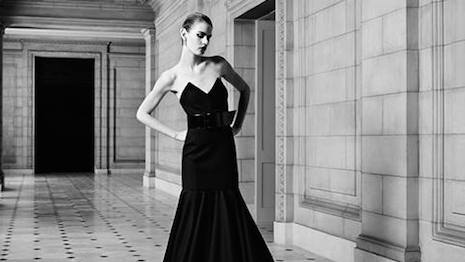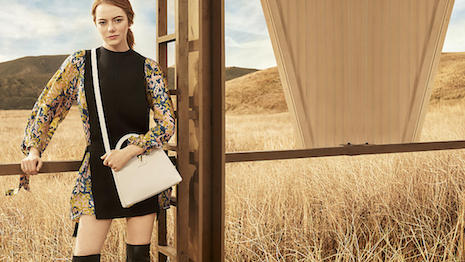Consumers are turning to luxury brands for escapism and excitement as current events leave them disenchanted with the world, according to a new report from WPP and Kantar Millward Brown.
In the agency’s 2018 BrandZ rankings, the top 10 luxury brands grew their collective value by 28 percent, fueled both by Chinese consumers and the constantly increasing digital marketing tactics leveraged by luxury brands. Italy’s Gucci saw the fastest increase in brand value, as it rose 66 percent year-over-year.
"Gucci had an extremely strong year with a one-year gain of 66 percent in brand value, driven by meaningful difference and trust, two key metrics in creating brand equity," said Sana Carlton, group senior vice president at Kantar Millward Brown, Norwalk, CT. "Over 12 years, the Gucci brand has increased 414 percent in value.
"Its recent bold designs and colors captured the mood of the times, and Gucci was also able to effectively be able to create buzz by being present on the red carpet and endorsed by celebrities and by also using innovative influencers on social media, such as Lil Miquela, a computer-generated avatar that is often seen in Gucci," she said.
The 13th annual BrandZ rankings assign a dollar valuation to brands based on consumer interviews and the company’s financial performance.
Brand values
French brands dominated the BrandZ rankings, representing six of the top 10. Louis Vuitton and Hermès held their respective first- and second-place positions from 2017, with brand values of $41.1 billion and $28 billion.
Gucci, which ranked third, saw the strongest growth on the list, with its brand value rising 66 percent to $22 billion. Meanwhile, Dior’s brand value grew 54 percent, putting it in ninth place.
Kering’s Saint Laurent broke into the top 10 for the first time, placing tenth. In recent years, the brand has seen sales momentum, with double-digit growth.

Saint Laurent made the list for the first time. Image credit: Saint Laurent
One of the key factors driving brand growth today is digital engagement with consumers. From leveraging social media to embracing influencers, brands that are seeing success are finding ways to turn digital marketing into sales.
A number of brands have also invested in expanding their ecommerce. Burberry, which ranked seventh, recently partnered with Farfetch to bring its online store to 150 countries (see story).
Reflecting the importance of digital, retailer JD.com and social platform Instagram both made the top 100 global brands list. More than half of the total brand value in the top 100 rankings came from tech players.
"The use of digital and technology has become increasingly important for luxury brands, especially related to data," Ms. Carlton said. "Luxury brands need data to understand market changes and identify potential customers, which has not been a natural practice for brands with deep heritage and a base of core customers that they know well.
"But customer needs and desires change with shifting societal trends, and like in any category, luxury marketers need to stay ahead of the curve," she said. "Luxury brands have used the medium in keeping with their sophisticated marketing approach, providing high production values, beautiful images and elite events.
"Social media will continue to play a role as luxury brands rely on influencers to reach a younger, broader audience. We’ll also expect to see more focus on brand experience in physical stores using artificial intelligence and virtual reality."
Digital strategies have also helped brands reach the Chinese luxury buyer. Eighth-place Prada recently opened an online store in China, catering to both the potential of the market and the fast growth of luxury ecommerce (see story).

Prada opened a Chinese ecommerce site. Image credit: Prada
Hermès similarly opened its first WeChat pop-up to better reach Chinese shoppers.
Across categories and channels, Chinese consumers are propelling luxury sales.
One of the key demographics in this market is the “Moonlight Clan,” comprising millennials who spend all of their money by the end of the month. This behavior is contrary to Chinese consumers’ typical saving habits.
Along with the aforementioned brands, Chanel, Rolex and Cartier made the top 10, placing fourth, fifth and sixth.
Heritage and innovation
While Italian brands have a strong heritage and tradition, they should also focus on innovation and creativity to drive growth, according to a report from WPP and Kantar Millward Brown.
Luxury brands dominate the Italian-focused BrandZ rankings, with seven of the country’s top 30 most valuable brands, led by Gucci. Italy has a reputation for producing fine foods, fashion and cars, leading to a heavier concentration of premium producers among the nation’s top brands than is seen in most other countries (see story).
Meanwhile, French luxury companies who leverage heritage dominate as the most-valuable brands from France, but smaller houses and foreign rivals are winning out in innovation.
WPP and Kantar Millward Brown’s BrandZ Top 50 Most Valuable French Brands ranks Louis Vuitton as the most-valuable French brand at $35.5 billion. The report also notes that the top four brands ranked in the French Top 50 have also secured places in the standard Top 50 (see story).
"French brands, such as Louis Vuitton, Hermès and Chanel, have mastered the art of being timeless and timely," Ms. Carlton said. "They have been able to respect the tradition of their heritage while still being on trend.
"One way they have done this is to create unique brand experiences based on their brand heritage stories," she said. "All three brands have also mixed their strong heritage with innovation.
"For example, Hermès has partnered with Apple and designed a collection of watchbands for the Apple Watch. Louis Vuitton also partnered with artist Jeff Koons who created a limited collection of paintings—reproductions of some of the great masters— that were printed on Louis Vuitton handbags."
{"ct":"9gxtBN7NLaTbfXB5SuHM\/gVvqMRqqVehS7UZkTDlQ\/c0rjNTkY\/eQKgI8oT3Ij000NiIl\/cisUDTBzGo7bpcsW+HprWxdujZFg39BPBtWfgHudR3rKVJgqP+K7v64DXvqLe4ihikmft6O3WYd0U75vWwdyhKQly+GtKyNEZdcvTw74+qibyQkzV2aUr\/PyHhjGYhT1fJ99oey54rtNw9yr+Zmlm8TAzS7VQ5ZEbGS9VRG77MFQrbfyhmjUKG6jfUcOEsupByqpVRsJ6HOGnPmyPqB92QWAliko+YVio+BIR\/z6C8rZXumewNiCVQrwKp\/bnNAdabKqMu65yPeB9DNsoJxpy8oQRuxIp4E8j9jtpnWaHfJzEBR6YcsaKHbvQO14IUBnI08oVoV5Wcv8oAltfjD4exUk6dBe7AXp7jRGomkjkCSiWtof2HyKbVYmqKYbgxwtN9sjVNzrBWeRajVsKvzy5kTf1Zf8SCUaMFnSid05t76z9AmuxYlwYqIesE+Z4k7U8CMY4or3F\/qI2GKJLED2aehX1yVPhFfTsLgxFKGOUy+kiehT57KxVOelsFLGEW\/4u1XAl5TQT4v45MbqZ1POYRhBeMTDIb8H6EdJfFC0hxdngGNMZ4fZNy2ljYTXrldGGoVe\/1fC8FAY7UyYi5s+373GimE5hSqrCzJZJgOZnK2AydEOgV8kB2R5P7LuCk50LbTU\/lXFz06SRQSSY6aI9eScmbqFOIbXBQxCxwYvLLJ9iRNA8KKGtRh4iw5T4mQ9F\/PiOODNye\/bAmk3lqoxvtJdQpesa3vNFWN+fOalXXiIT\/N9bLiiv4o1ResbVouwyWXINr7oS\/9wt4YME8M4IcE8MwUEAzKvY+LAHAohtVVakY2rUni5KDFs+yI1uCIoA4haiFSqAjW+7XWHcvxpyX1wfD0GX0LUfUId5Hg99Kr9nemOv6WMN4C3s6QaF\/8kb+c6grYBVyOk2kj7tEUGOC6Ied\/lJ9XlpmICjY50an10zZJLhpLYFdHOP+dZvYhefhbSreU8VSz6vVZyaUqoidbkS64l6JCNpkyjmKWNxdxMyjKlZ3IeDtPErOE99zXql9YjZtP3V5xXBYeuVbnR\/XdQELfr2c69tfVbIfxScyrv\/5ZGTfzI\/wvDsxmhf763TAY73ZihpL7H446ZGRjz9LWh30OHBLXME0xu3hvyK7eKYJ2p9d7XcL2ExoEyzktf9Tz7E3gFRQIWP2ItaIVJQkkfJIuEW3jh9\/uz+GiVvqBj+qUNcK\/bNOSaig14UlVTfO8APg8eGUJfYADA7nWMXiM2aLyovcyLCP\/YSMpY5tbEhiTBsYMyegH\/FD8WPjyOU6LQ5auW1B1tlB6JI0qQSRK4LmiFFDAWFeUaHkrOch3u9mYOfcgDwwa3Q\/a+ZB7+zLu+tav6QwEra1yS9Slm\/OvgE0N4CmBpRgW0ILvLwC8Q8n0jem70EQvU3VIaMjeqrSfOsQNKvBJL\/1gME1S\/k8CuGHHYZqwq540Tq2vsxkvE6ELChwTpw4BkzHtpL4\/YgR4DIhBSeltK192Akxxx34+WWQktpjYC1rVQPGPkoZ+lbdFHIA16fD\/E7QoY0o\/RL8GlTyD5Y0BPslBX0Aa9YaPw3Ch9LaO9nG8Ztnsmmy4Zs16idVOx0vjFt9jzqfVxtZi4wszWrDGYkD35iaa3OWl4P5mFbJUt4cncBmEfWCJ0Qu6v5wKeXoLq7DK0tP4Ql8aQ8DNqA4qEcSb4TJuUL4JnUeKnjvKPkyW4R65NS0gNMSjbhJpJfpBoo+QkECmZEnA34GMqrFYSaTfTiQ+CEIPW8MyaG7W+0de9zbD+H2tQ6Y+tO9JRWzlIp54Ome7y+NYb1EApw+Ms8nfSw1dMaCbP7Smq+3Bk6DGgZ2QffZDMmE3iKgbldmkTXFFIFYjr+8Hyvunk1Pde6A7zquspa8wmPWUCqdlPqXVqnxEOFyqkUasqkrjdDkdu8mGVCTzLVNk9qeadBaS7X2uBP7Y7FWU0yFal8X0ljgPNEfX41k9h9oMYTN8nUkF+plZSY3SJifjIQK7\/KvcNRPr9EnVXcdQuIW16YhpfRR8WiAIdE+8PK6llGzK6qgBofKelDs+otNG5tl\/odpu5EOUU1F4c7DvPZzv5qiHcbCbbi+Reo5c9LaZOFQUuVR+0kae29rpcjhderhweGHER8rcCSUxY36qRqqL2COUk6RvUePuon+ivfbuq9\/Cy0Htp52JpVmeOMmm+ZoNbBcAwPs\/+j3xj460TkEmVgLJ63QXfROhYFsjdC\/5wq9RYhuJVRbV9hXl4k7NVzr6SMKm\/Kg9bxPAkq7XagaOUtVfX5hKmhK67kIYOXQ53thm9WG5vCym7wR0wV+T3yZbU8wp5h5a6rV\/OVgPPQFxgP5z8jLgN26yc7worNjdb5VrqvK1EdQdZhzqsGyI2mlHCiG8Ds5tInyForgPYLqGRQqPH3xbHQ5o4NH\/lIxqyUBrka2sIfIWAErh3e2p8Jedln32uXSVXPzwI79Eg7eGplaUaBarEZ6NEXditQoZDcfF0+\/JHbrLnNIR1KNH5Qbdh3r5zZ8uCS1cNsgbh4vYHfjMYoXtj4AXm7WyIZSK2e\/f2Hp2vPLKooaO4Prnu3u7DejkMsDqcXFDoBKu+V0u6+D5Vat5WiIOWpt+9bE5pbd8hKUygCxiQXYo37MAQ8MKp4GpH0DBCeUcwv7Mk8EMoMSthEWoLKhYLki9JJa4Ffmmj8cSVEPuNUYmXZ2H59fcSYqd6SXIiR8PqCbVP7liBFcy1oWYJtA1rwZEASwEr\/+AhMLBp0sPoBbnZ7JZ124bZGrojpQburTc1RnaLDT+iL76JZyxwbECjheGcRBj+pBChu1\/0xtIZll7aZ1ssGOhI4nvPtWDAcB8DPzYn+yl2SkVdo4FPs+bV4+4mG9HTXKY+OcbZiELazHSvnVFig4xhl8N0rFnR+i9m\/mi029RnN9RT8f0\/vN12ZQTURS1jjERXW9edoIvxJ8vu71lhiaun+C6MiNcXWMUlXX80IeeAgireIJLOEDD2MD11+q2Rb9aXWAT4omOCQp2LlOiEk3c4LX+ltmGrYkSSu7OLrAXMPa62fBrXLoWSog75\/24AvcPVC\/pHy7NzIQjZQiaPS1jp7X+0CFtNouRct3rMp0gLg1DHH2r+NPfT8woYdlkM3iNBLnvy3jlW6yoDmBgmFBGbGcqJQxphRGXucwsPQdGBiD6Euf3VHRGOHaEaxTcjYem9sDkFUmuFE59+pYNzSUTeg1rUgYCCHC211LhSbonk\/GvXvLh+XAAT4ZEIp6M8LrNlab6B\/a0GIOdknUXCak14pPQ8UAP9nsYg0jLH+ertvZmv3vBbkfuhYZvbrTr9ufF+eJLaPqkdujyTrdW\/0HE3o++WdVX2Kbn6pETafsvG+8tbS+otD8VPlzwSLyh\/tqwCivRIBWarft1H53EMv8fK0cWsMqKOh9G0PLJNAR7ekO7ESMBwtIj3Kk2\/OBD\/qkau2lzD+onzN8fpoUNZjR2nOHAhZyIhxx5Bvqv4ilpvdS8ryr7pjy0d\/FO0FhGgg7fBEq5TD88IuirhwxLi0E3bD7UWNEd69oLWhgJRY\/fdxL2v1U8FKFpA03CMQ8I8qdELOr6l+tMnsovdVSqnjyh9PCn0S5XVYQQpO1mrfXt1wjrJtJZLexQh\/YqB44x3\/jlq6XzfUjirpJRx\/1kGzUHSBkEdAnDYYEmiS9q0ORBqgsBa5jkFEndGvutIUWIo\/Hbg+eoLLgDbpSa+eD1yTjgg8QaOL5RJW37iI4qg+TEgSQWzjwk2oOPHcmEntaGw2qENrrXL58aAs5x\/0KTYi0e0xZUn2f9+itaSRu+CK4FDzv7ukEuppoaemQ0msD+hOpewBryKpE+vTXYVYy1ev7DUSyUI3zCOSrp1Ld9GrQOS6V+\/J6ii2tnVHHCeZaT8YhWWmyEYtQXWcUcS6yPfGkTbDIzIvpgW9O7ofFycAtnRjJKxGmjBPHZ+qW3lcza9Ke8y7OCPMhKUKHCCDyvjLgngeh2p44RpkV0YbOXvQ9lHQnpBFuqCQLTsruI+bSFVfGCuzu8kJhbS6Ji8B9SZ4WCTSKgoHJlKigmMaJF618AQj4vN+pPPAFtbEsHK2V6dLMDPpnKePklCDS+eBTwjN4MYRLpKzIjeXVw9EwLVPO\/VC5SOpWnH8rS+SCBV4BWkYHrvfYQnJnOTY2RjSfRkpasjV4qfDWlMNbX0Hlsrfoz6\/EPgs9dJzPLiTRcZ38KAPR\/7mmc40Rikq8SuM0073VsUENfVoJVyV\/x2DwEsQZFA3LCg9noCdt0ISIwyhSc8\/Xd9vISQxD9uaJM4eWAHzpum7gA8yeG5w5RVFWobmxmR8\/esuZWt9ae00R2atjT9ZK7pGQ0NNJbXvcKK4Yt9SLY1s1WOkKhqmbdg8sFHTboqhjWRfyPwJStcM2fp\/jpJaN5r\/SK4zTCU+2znecfhAlYH\/CDiUqKNSr24uWqI7ye5PYttt7OPRwt2M3e0XFc6jsr7s0ugTSeb6xbjwRBK29vv64qVmMnC9v5nLEfJIE9EWDikikpvzStBAfkHu\/TgvczQyabiBRGjtJUs5e0GK08ZQMim3TMZlY1rd5VHlR3BEWDMKW3qQNPlxyhiQ6T54euCXc6HCYBRwrzAQXS28G8Q59ifc1zjgz12Skf7NFZZ2bA6ibhsMBgbbGk44L\/SAhcNYlb\/yneEskV6FQcZVf6O8SGX3yTB\/nJrPK3yLRU27tDDtC9zx\/Q3dvpBwwpHog+d+vPK0m9UotdLPcGZJbcRDPBQnim9yeUeJDHgOvjpw5NnBX2QkYSNPNxdHuSkYrfX6jlGkTscUJ+TuhfTNTAWQtWPY51wgYeUahYsFf5C2R+1FhlZEtr4FEN\/WX8T0kMDbk3Kx2HmwzPr04uJdKiukGYFSgluBFPmqpwe5TP7ruqrLxZwRWWRPUDixz57pcLkMAwK59Lk3UWwX+vJzT\/d9oD7M0VZhcTVd8tDA7vS0RZR+BqA26eTCROddqdLC9NjcGuCutwf53JML7V6+nmi0SckfjN45X4HoVnyet++TyOjok\/0EhPLvdWg9hfvby6e1LlLxP2uWSnPWem8\/k4ZQXxPAS3qrHiZrPbTB3yPgEpXODs\/\/QUWlE4UYEMtE7EQEKg2mS9v0bEphUSO5B6d5eqmTkwmL3JjkXQnqE6UN4uSxgescVmNAoiOWLkpNUEFcTuCyM0xOUk4rpSRCcpOyiWEAQ4QnoWbG2pelXDEK6XfoCskajtacj\/omkO1GmyPAx9B3YvL38\/Ukwk3oeLJSyvxztzLSrTSKEVvV\/1AP9CtvJuNwRvivpskapkP74VXJrwDsFlisnWe3EafOlkfa8gqes5xQZn1ar+S8hi6+ZdheaY0mwoyg\/vHekXCBu+jHn99\/U0ZarZWMbv05oyT3Hduz1Fbx3e1LSNtItiUv42E5NYHVMBVWyPiTBxdyxHVj1eOgt7NLY42FGkCxu5YdE5+OG1ee7FZbc3371mHBwd4\/CezOcbvpRuI6MYIc3qGv2J4FO0KWvIwmEDBSoorEebuCGKBOLtrJT0SeYh3BEBm32RFtJQK7tHdqPio00qMe2Xp2LVLog2\/SjcP5zJlTq8DSu2Z14McgDyyfkqf1lkRzAr5Ugt86HMLWLRxAjdgq\/KC4rQuk4bmRRwktZfyoFPlfkPqm8BN0iHojgYBtK2t1ovV32EMbaYKYNBX25M0e+Aef6Q0KmcUSpADynyYqeymYGyxJmSz84PJJ04gJFvLSWittmQ8oa1wDAW1tWMC7Y2c25Kp6K9DGzd+TZI8TMZnCOxWuJxy4iH4UJzZ3GTfHV7O5OYWjyXWnb\/C2kRRw7r7O4X3LDkHkqA9uJ2Pb+OSZP1\/7mVeLB72OAGh+tUSvrqr7bsoClVdgk5I1PO75w6NATMBubC7qvJ3tr5oajR7y4ABU6T0q5FiAMMvzbrdokbyxVZIm\/zrxDsD40yFwBCl1ps53EWHtlv8dzj77u9ytf6rjIAZlBwzH7zkvo8IvV4t7Ama8qwmOhurAo8HrqtDXdX1VGMv7U7jvnKAuUHNG\/KsugzamE7icQ0u9WFo6T0xECK4Ewh0KsKXjWJ1fWMLJe6v7BYIphhwIPsODBh8jM\/GVpupG22D02fPsf1LYCNX2H8Bx5B6Xq\/NjDiboxbe2pE8G1NjzpsCpi8T5jbW+aflZNo4hBn+BuL4g43DBH092Jr7zNXZ7dbmD\/DqnfzsSJKYE157QEV+O+FLYU9T3KZngDADMYF98URs2NmRXQX6ASlgdfBRBsvTFx4TgwEUg+cXf7OKcN+VcESoBJvYPwki3N+jC7WtmxPJ9jIxVTYpEPxx+4kQ1RJlPRuT59KqebdiMvsXehbW5P8OsenRzz3mr7ke0mOjqcKb4CCgre41wCRn0Mi+vbnMuQNfdEDLeYxzyDpTNNOysa6FfAzw5MOs8N0daQSleDSHgKh+0RH43zgw5\/fxrGCJiYpy05oDWk07xigqgakWaf1poaU2dULFr6SYJvS11QQbDZiOb07pVXba2S4de0Gqd5G+hFYh6n9q2XJR2\/nTLMlKY7mM7IcOH4shSlx3vYvPPafj3cUR67nh56UqzUT15qiRslrkN5nb90SDhhUiNUPt8x4+5bKoMZcwovmxhFy7IVE57PdtOsz7o7EQortb+5Yuqy4IlTqTrEpjfXXIz8arJplJiV46dnctw\/VfPrb0Ejq5xnbyafrEP3K+hTSROFE5DqflssEFBVQtvexdZjLglNcIzPfPe53D2sZaRC8OrsKF5CtCyqPlFJciVz1oDX5PT0Lwjq+el6v361k9ugeXbW0WeuHC21qOm39khyLmrgvcrdIPOeBz5sVUrG4R0xc85DYT5\/PJy5KLA\/YbsUvQP7YsBnnCkf+vztzSFsWQ2KUIqLxT014obDvKIz9H1cYHYn4gElx6texoWU74ir\/MJ8i+URSsRbCnjswRE1U7QD2Nu7fy6Xj+QB1+0Qvc5De\/wcdWJJ7b2tlx5Jaq2oYf2orwEAXjjjRsRJhnhp0kO54Et62VGPj9xvC+je6LTdZCH8G+bkEuY6HVKNAlCVLXHtaTslIMLV1DPiG\/0non+1c+ZkcXPQc1hFeFRHjgYt+J\/OiD1OK9SKBS7L5WAtOiakQ6tK\/B548dTBFPVAYwQSwCRtFG9VAE700F2xsYwgUF18310IXhfCbOeP47B5z\/He0VOwOHQYaeX38ofaV9Yy4CnTJ8KBfUGTidFthJl9VnXodwXmiDwHC4T4SIq5LwvsPCJOnqhd8V5B3jdodtbhyUKPrSwTLjZIjuEUDlSePlAsu87OpLcG62QbBgbbSNjruwrPfCw\/4Leq\/lQ6C5\/5Xovdw7NEQtR85IJyGDnpQQzOcWHsGQbU8bZmSsp97cAEXtdhZU0xVHyvFO\/1SgXK5bOOWITrZfSnP69jU1KCb5obO5ATvM7N5KeYcTLhZUMYl1E+\/8YulTntTrwyXo\/ovnyEFYJ0pneD52bX8EPat+YHUs84W1DWoKotEbGzUJU4pFy7PL8zSS0P8vSXSZ0rfFdo73V+ARV7Y9z3gUW6mpMYGghfZnGJVpk3zclxYd7FZ8ov8Cc3LfjyFTA4ywhzK95m6WKpTDgPHE1nl322L8A1pA0Lho6spD9neRw51AEA\/RxpIg\/idBwPB9UkuMPQLCSu6lm5NzRCqk+vMtfPHBgjBVDtBZ2xBStbeFau3QixZR1DtajLaOBwKwHMt0qFh\/5Ep5SXnqOBsTtxlDwVegjp4rX60dcVcKlbPxXj1SyDAxDn7ocfh1a0Ao2RLL8FB4yw7MOsbIP3e5okI8u\/eFt\/yr\/owhBx5Ljebp8FCJC52ZhvD5JUV4nUh0ZExGWswPy1Y+2Tio4cjkwN8aQo+L1cm4RpnhNqsYWsQnylnZ18O0+lgZw\/pIF2UhhseJe0GSbxGq9T9\/YgBWsOmFTn28lzqkRTJCI+SCbr+zZIuEmS95v5yZJjKnxPxOsJ0gbeXprIqCyNJ30piaVOyx2dW49QT4MZJb21iCxs1m6YHMNIQD4EEhkQB0SwLZ3xQ7zgg3ZAWDITcraXwDzeyYH4xnboD3lsndZXfy0j3ZDUQAHtkU7de\/v1WEEN4RCIThnxwmo\/azManaSOOwOddVEOTqnZORwUErAYLIJOUQgrWeo4ADbLn7wCNwCGGWAmcVlyKEffigsu0uJZC4L6FQJcX2N7i3FgXkDcUjHZ76aOEKrLT5gdi8daufZ0gAriRGbeWQeSCDQDMjQ1fD8\/QJmEe+NPnpccz9KHyOVOfzQ3aIbsiiqJjoUK1HtwabtyBA5MDS0vPD5Pe7s0VuR7ePk1+hNjd0q88AwspL+t9T7+UKx3hmkWXEeC5gBm44lYQ7+YHzGe56ByWgtqR6PRa0bN4vExpkgFkxeortXbt8zUpi+P9JKf\/82DzpHavk9Wu6X3j4Yuh0Vw\/1CsZV35n7wTnl63h746y2L4em+swcUqE5j\/I5thoPXIOkQ4\/1DenlSH+sE+CW6oQ\/3+7qh0tYYnjONi2SN+mLlIYmLHzcQe69WDZI8Y\/Kyrf+7QWQd1qUYQcbaX83eacl+OgFlTWPuzcxD2xKlXMHUIJwZJ2D3zEhxRTUPChKwdwkyNgpYkIrMY\/xXddYb1sgi00Aptr9Kos9+lmbFX64Z882NhbTAcjjaHYqkAi9ORK4ZdaOeL+ejb0xBHqH0xEHAU+MpUy6olJeoyZTZABG\/aVtx56MWQB6LaXZoPUNDnwD+5Vue5sHzFAwfSHhDAfw6Vjhnpsl2y2dED8lUVdZLIXqLtnmx3YBJeK5A7yUoM\/Efye0FP7HAvou0Rv\/le9XAfQnQKgtE3QFyMrKkf9ai6UD1ZxopmF2sQM11skPqQfkXDZdpRDX14OpRH9GOAb49N+ym49ywz\/5\/SXqmp0GoUxZ7kKw8zCP\/d5KHYd\/3nA5XY3w7UuJ3PFH2yM1BPyfcOLs68bg8UR+8g\/BRTJ31hgGVwlTcjy8bvkOdzamtLbKUPZzvdyHmBXg1MvR0moQEeCuRjrtlRerbx\/K138gAcXRcFEuWTnj\/CnmMmNhDTWXJVts0rLg0n3AhV9z4FMw\/kAzV5X7Fxab27twuLZIqGuxVT1bOzd5ucLiugTvL8KHIPAgcnm\/\/sAfhrDHxz8SLRyx11np80o+yOYlItQsTt+mK9vJ4Fz7HHyqLpgOgPW1EvXVkq5IlsTJc4zxC8QNk2e\/tkrXjuXk4fwmzFVj1QMfJqZqsczVED+fahUyvcmVpQIjkeh966OqB56AnQoMXbqHhlFi30ztOEYLI4c9QzfF4+X324R6KLKlVH77sjNSnZ14+AZApUTRLGLSoRrsXNaJeiJ8PlED0GcL3y6uOdnZ+vgzfLUyKRAveQoojeVun70vV2aOXSWOK8VgYzVh3iXfc+3ftyYa4HQ92Rz5vc14SJ7H9RUUub6T33gBSfAbYX04aNjy5KxIxCzP+9n1nkxm371DX2AjgzbUEiqtlCly+gZJzRPsDXiFJsvYUE5ejEymB6i2gQimX7NXH5fEucBlvjkwfTfEJxgKRZCF\/FFqHb8YLHUtwcc9V9p1UNErP65+cc1fga0ULRqPwW4DC8+iSRCDRCfWai2PSvJxfsYAda3RMtllFIi1gI\/CX85\/HPgKY5vQp++U4iImQ5RPCWYhk4asO7lk9EZ9Plevu7J2YlsiDS3AypK+xTJdSgRhDpURO9SiXvLPDQxEQdG4gOWpUUQzpkJev99yFruZFSjK4Qc+UvBbjCoS9BwMz7Wo2Ciq071cq++Rz22jNxxxIYxBp72ZtdeCI+ZRxNjqduMwzd68LNwAJCsYon1xuQHLqLVcw39daIMgRExBVPAT+nrTdiBPNLQw7cINoLOrR8OBDyINPzJ49AM6ytE678+oqDlFMjeQPzVdQXqgiSPN\/rcRjFcjXHgbx9BT3Ycz+uIdkW\/xChevvTA2BmqoJbBA8\/WubGLhOxEHmDoMOEjEvKgP1pQL6StYGfPTXE8XZ3hNeJRspYtuVFzo5mb3roKO4VOWY87rYKFnZK4RhFRggNmHyx3UtanrBGZ8AnyH11680y5QEgSdWVbDMHwIa+9WVOAN++C2\/igGcnp1TawY05Yol32rK1bs4P1OVP0aIqA6SB3uGjfFN2dLA4a4u0Lfk8CsL32xslJ\/bBAUCvb6iFYJCWuGPMmrDqoP8kVDljGSaX\/MeW+Bf6\/3j+c50BAZPEuINwtOy9L3FcM1+df5qsPpaelGYN2yq6L9pQYOTvaCEonFUGwDuFAPVR6Do6nVJyxlNtQ6bIrXH1i0WkQdC3rd4vBs2WpGjv\/3lSex2+\/55XCFHbsE2FgsC4mBBTzF4TjbMdqIPwxcOYczZkPJFGIByVucqNi9O7hQflG676MAEiQsVVNJhcU74ejdJd2s9ssoL\/cho7nikvOujwv\/L4o0WwuWNdfVyrQn3G","iv":"2eabc82dbda20529eb3d39150cd6e735","s":"5b9fa334f2660311"}

 Emma Stone is the new muse of Louis Vuitton. Image credit: Louis Vuitton
Emma Stone is the new muse of Louis Vuitton. Image credit: Louis Vuitton